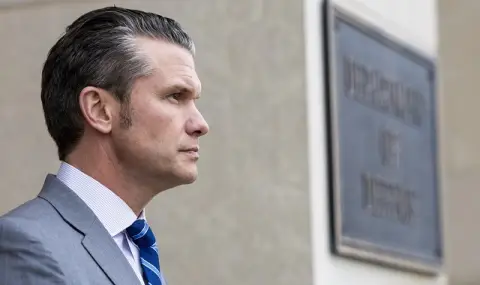Pete Hegseth, who made his first visit to Europe as the new head of the Pentagon, said at a meeting of the Contact Group for Ukraine that the United States seriously doubts the possibility of Ukraine joining NATO after the war, Reuters quoted him as saying.
"The United States does not consider Ukraine's membership in NATO to be a realistic outcome of a diplomatic settlement," Hegseth said.
He also stressed that allies must recognize that Ukraine's return to its pre-2014 borders is impossible.
"Pursuing this illusion will only prolong the suffering", he added.
Hegseth also noted that the war cannot be stopped without "a realistic assessment of what is happening on the battlefield".
He said the United States is seeking to end the war and stop the bloodshed. He stressed that the guarantees resulting from the negotiations must exclude the possibility of resuming hostilities.
"This should not be Minsk 3.0", Hegseth noted.
Hegseth also made a number of statements regarding security guarantees. According to him, these guarantees should be provided by "European and non-European forces".
"If at some point peacekeeping forces are deployed in Ukraine, this should not be within the framework of the NATO mission and not within the framework of Article 5 on collective security", he emphasized.
Pete Hegseth also noted that regardless of the outcome of the peace talks, the United States will not send its military contingent to Ukraine.
Part of the speech of the new Pentagon chief was devoted to US relations with European allies. Hegseth said that ensuring security in Europe should be a priority for the US's European allies in NATO.
"As part of this, in the future Europe should be the one providing the bulk of lethal and non-lethal military assistance to Ukraine," he said. Currently, Kiev's main ally in terms of aid volumes is the United States.
Today, a meeting of the Contact Group for Ukraine in the Ramstein format is being held at NATO headquarters in Brussels, and for the first time the meeting is not chaired by the Americans, but by the United Kingdom. The talks come against the backdrop of reports that the White House and the Kremlin have begun actively discussing ending the war in Ukraine.
Against this backdrop, concerns are growing that Europe, some of the US allies in NATO, and the Alliance itself as an organization, will play a secondary role in the settlement of Ukraine. "Politico" writes that some EU countries are changing their strategy so as not to be left out of the conversation about the fate of Ukraine. Former NATO official Camille Grand described the position that European countries are trying to achieve: "They want to be at the table, not on the menu".
A senior NATO official, who spoke on condition of anonymity, told the BBC yesterday that this week was set to be a key week for discussions, with several senior officials from the new US administration travelling to Brussels, Paris and Munich. The challenge for European officials is to understand what strategy the Americans are pursuing.
The BBC asked NATO Secretary General Mark Rutte about his interactions with the White House. Asked if he feared that given the active communication between Moscow and Washington, other US allies would be left out, he replied:
"NATO is more than 50% of the US. One ally is responsible for more than half the strength of the alliance. So in that sense I have no concerns because we are all engaged together in the work. I wouldn't like to speculate on what negotiations are going on right now.
"We must not lose sight of the main thing. And the most important thing is, first, to make sure that we can change the trajectory of what is happening in Ukraine and that Ukraine is in the best position to start negotiations. And, second, to make sure that whatever the final consensus is, it works and will not be challenged by Putin in six months, a year or two."
